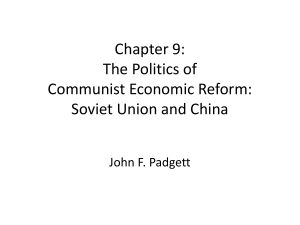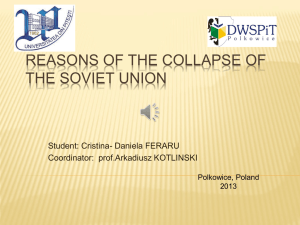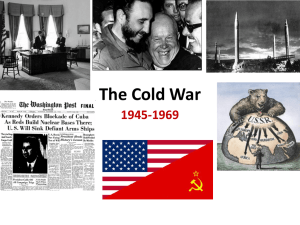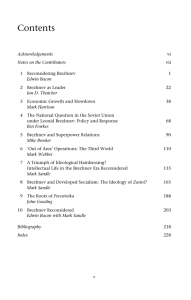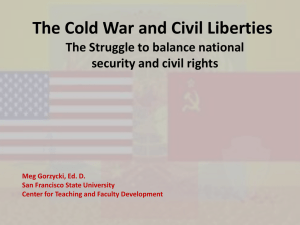Communism in Crisis 1976-1989
advertisement
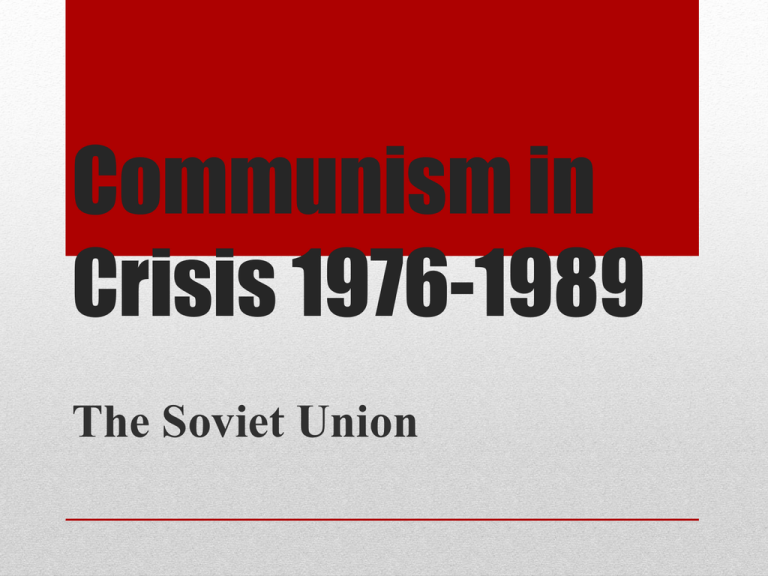
Communism in Crisis 1976-1989 The Soviet Union • Leonid Brezhnev assumed leadership in 1964 with two titles: General Secretary and Chairman of the Presidium The Brezhnev Era: Domestic • By 1964, USSR had industrialized, improved and increased weapons production, and had become technologically superior to most nations • However, consumer goods and agriculture had NOT improved along with weapons and other technologies The Brezhnev Era: Domestic • Money was spent disproportionately on military and space program than on domestic life • Standards of living decreased during the Brezhnev era The Brezhnev Era: Domestic • Brezhnev tried to increase agricultural output by allowing farmers to work state-owned plots of land and letting the farmers keep or sell surplus crop production • This was a major reform from fully collectivized farming but it didn’t improve living standards The Brezhnev Era: Domestic • 1975 yielded another poor harvest and Brezhnev actually had to import food to feed Soviet citizens • Because Brezhnev and USSR were so focused on food during the 1970’s they weren’t able to increase petroleum production for sale – this could have greatly benefitted the nation • This led to public criticism of Brezhnev and Soviet government The Brezhnev Era: Domestic • Brezhnev maintained strict censorship rules and strongly repressed all speech • However, some brave citizens worried about a return to a Stalin-style regime and started to risk their safety to voice their anti-government opinions The Brezhnev Era: Domestic • Alexander Solzhenitsyn published The Gulag Archipelago which was an autobiographical account of his time in a forced labor camp • He was exiled in 1974 The Brezhnev Era: Domestic • Samizdat: selfpublished pamphlets that were illegally copied and distributed – these criticized the government • Tamizdat: pamphlets published abroad and smuggled into the Soviet Union The Brezhnev Era: Domestic • Soviet Jews wanted to leave the USSR and move to Israel • The Baltic States of Latvia, Estonia and Lithuania all wanted their independence – these states had all been forced to join the Soviet Union The Brezhnev Era: Domestic • Brezhnev sought no reform to the Soviet Party • Brezhnev emphasized employment stability – it was virtually impossible to lose your job and productivity was poor The Brezhnev Era: Domestic Soviet propaganda poster showing strength of Soviet workers • Brezhnev tried to increase living standards with agricultural reforms but failed • Brezhnev censored and limited speech • People started to protest Brezhnev and Soviet Government in the mid-1970’s as living standards worsened • Soviet Jews and the Baltic States sought release from the Soviet Union • Brezhnev emphasized stability, even though it meant hurting the economy The Brezhnev Era: Domestic - SUMMARY • The Brezhnev Doctrine: all communist regimes are to remain communist – the Soviet Union will not let them be overthrown • This was demonstrated in Czechoslovakia when they attempted anticommunist reforms The Brezhnev Era: International • The poor soviet economy encouraged Brezhnev to seek nuclear arms limitations with the USA – he wanted to spend less money on arms and more on improving quality of life for Soviet people • May, 1972, Brezhnev and Nixon came to agreement on arms limitations (Strategic Arms Limitation Talks – SALT) The Brezhnev Era: International Brezhnev and Nixon celebrate the signing of the SALT Treaty • In the mid-1970’s, decolonization in Africa meant that the Soviet Union looked to expand its influence in several newly destabilized states there: Mozambique, Angola, and Ethiopia • The Soviet Union supported the installation of communist governments in these countries The Brezhnev Era: International • Solidarity in Poland – a labor movement organized by Lech Walesa in 1980 with the goals of improving workers’ rights, and political and economic reforms • Brezhnev wanted to invoke the Brezhnev Doctrine and intervene, but didn’t because USSR was already involved in Afghanistan The Brezhnev Era: International Lech Walesa, leader of Solidarity movement in Poland • Soviet Union wanted to rival Britain for power in Afghanistan since late 19th Century and had intervened in Afghan affairs repeatedly during this time Map showing border between Soviet Union and Afghanistan, circa 1979 Soviet-Afghanistan War: 1979-1989 • Democratic Republic of Afghanistan formed following the Saur Revolution on April 27, 1978 • Afghanistan had been ruled as a monarchy prior to this • Nur Muhammad Taraki was leader of Aghanistan until a shootout in September 1979 – this rebellion motivated by Islamic fundamentalists who believed the Taraki government was too secular Nur Muhammad Taraki Soviet-Afghanistan War: 1979-1989 • Hafizullah Amin became new leader of Afghanistan and the “rebels” • The Soviet Union sent troops to “support” the ousted Taraki government – cited the Brezhnev Doctrine • The United States sent weapons, CIA agents, money to support the Mujahideen in there fight against the Soviet Union Mujahideen fighters Soviet-Afghanistan War: 1979-1989 • Soviet leadership didn’t have a comprehensive plan on how to wage war in Afghanistan nor what their objectives were – they simply wanted it not to become capitalist/democratic • Most Soviet citizens opposed the war, as did most of the world KGB Agent Vladimir Putin Soviet-Afghanistan War: 1979-1989 Under the leadership of President Jimmy Carter the United States: • limited grain sales to the Soviet Union • boycotted the 1980 Olympic Games in Moscow • Conducted secret operations supporting the Mujahideen using the CIA US President Jimmy Carter, 1976-1980 Soviet-Afghanistan War: 1979-1989 • The war dragged on for ten years • Ended February 15, 1989, when Soviet Union pulled out under the leadership of Mikhail Gorbachev • 14,543 Soviets killed • 80,000 Mujahideen killed • Countless billions spent Soviet troops exiting Afghanistan Soviet-Afghanistan War: 1979-1989 • Leonid Brezhnev died in November, 1982 and was succeeded by Yuri Andropov • Andropov wanted to reform USSR’s economy and overhaul the Party with younger, economic-reform minded men • Afghan-Soviet War worsened and was an ongoing distraction • Soviet-US relations suffered when USSR shot down a Korean Airlines flight that strayed into Soviet airspace (1983) Yuri Andropov Yuri Andropov (1982-1984) • Andropov died in February, 1984 replaced by Konstantin Chernenko • Chernenko a die-hard Brezhnev follower and ended the Andropovera reforms • Chernenko died in March, 1985 and had very little impact on the Soviet Union Konstantin Cherneko Konstantin Chernenko (1984-1985) • Gorbachev was selected within hours of Chernenko’s death to be General Secretary of the Communist Party • Upon taking office, Gorbachev promised to reform the economy, citing labor, productivity and scientific and technological changes in industry • Gorbachev called for “New Thinking,” for foreign policy emphasizing international cooperation over Leninist beliefs of capitalist/communist conflict Mikhail Gorbachev Mikhail Gorbachev, 1985-1991 • Perestroika translates to Rebuilding and was directed most specifically at the Soviet economy • Allowed plant managers more control; allowed profits to be kept by workers/managers; allowed business to set prices and wages • In first years, Perestroika led to rapid inflation disorganization in the economy Gorbachev: Perestroika • Glasnost translates to “Public Voicing” was a policy that increased the flow of information from the government, publicized historical government corruption and inefficiency • Glasnost allowed people to speak out – the government no longer controlled all information • Glasnost was ignored when the Chernobyl power plant exploded (1986) – this undermined both Gorbachev and Glasnost • Glasnost contributed to the break up of the Soviet Union Gorbachev: Glasnost • Annonunced in January, 1987, Demokratizatsiya translates to democratization and transformed the government toward democracy with multi-candidate elections (not multiparty) • By August of 1987, 47 informal political parties (neformaly) had formed • By early 1988 over 30,000 neformaly existed • Ultimately led to multi-party elections Gorbachev: Demokratizatsiya Gorbachev: his policies and Eastern Europe Reform: Poland and Solidarity Reform: Czechoslovakia and the Velvet Revolution Reform: the Fall of the Berlin Wall

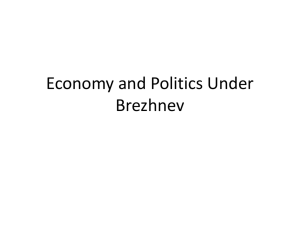
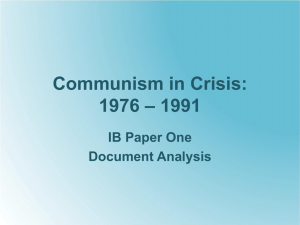
![The_End_of_the_Cold_War[1]](http://s2.studylib.net/store/data/005216723_1-d7985d2049f1fbeae49e8feeba5d6d3b-300x300.png)


